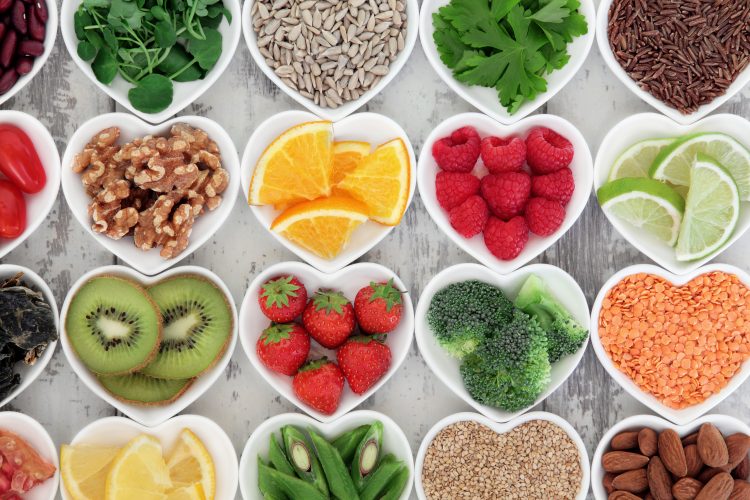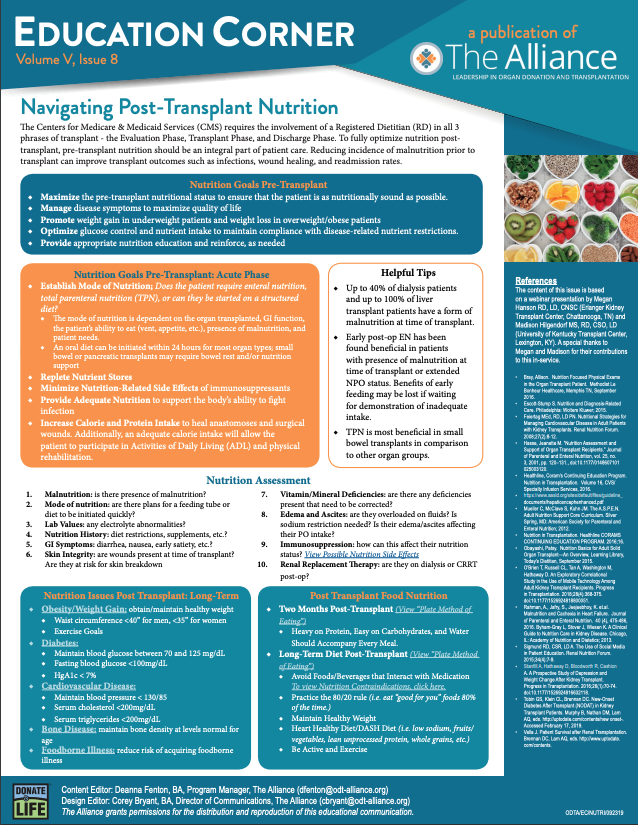The Centers for Medicare & Medicaid Services (CMS) requires the involvement of a Registered Dietitian (RD) in all 3 phrases of transplant – the Evaluation Phase, Transplant Phase, and Discharge Phase. To fully optimize nutrition posttransplant, pre-transplant nutrition should be an integral part of patient care. Reducing incidence of malnutrition prior to transplant can improve transplant outcomes such as infections, wound healing, and readmission rates.
Nutrition Goals Pre-Transplant
- Maximize the pre-transplant nutritional status to ensure that the patient is as nutritionally sound as possible. ◆ Manage disease symptoms to maximize quality of life
- Promote weight gain in underweight patients and weight loss in overweight/obese patients
- Optimize glucose control and nutrient intake to maintain compliance with disease-related nutrient restrictions.
- Provide appropriate nutrition education and reinforce, as needed
Nutrition Goals Pre-Transplant: Acute Phase
- Establish Mode of Nutrition; Does the patient require enteral nutrition, total parenteral nutrition (TPN), or can they be started on a structured diet?
- The mode of nutrition is dependent on the organ transplanted, GI function, the patient’s ability to eat (vent, appetite, etc.), presence of malnutrition, and patient needs.
- An oral diet can be initiated within 24 hours for most organ types; small bowel or pancreatic transplants may require bowel rest and/or nutrition support
- Replete Nutrient Stores
- Minimize Nutrition-Related Side Effects of immunosuppressants
- Provide Adequate Nutrition to support the body’s ability to fight infection
- Increase Calorie and Protein Intake to heal anastomoses and surgical wounds. Additionally, an adequate calorie intake will allow the patient to participate in Activities of Daily Living (ADL) and physical rehabilitation.
Helpful Tips
- Up to 40% of dialysis patients and up to 100% of liver transplant patients have a form of malnutrition at time of transplant.
- Early post-op EN has been found beneficial in patients with presence of malnutrition at time of transplant or extended NPO status. Benefits of early feeding may be lost if waiting for demonstration of inadequate intake.
- TPN is most beneficial in small bowel transplants in comparison to other organ groups.
Nutrition Assessment
- Malnutrition: is there presence of malnutrition?
- Mode of nutrition: are there plans for a feeding tube or diet to be initiated quickly?
- Lab Values: any electrolyte abnormalities?
- Nutrition History: diet restrictions, supplements, etc.?
- GI Symptoms: diarrhea, nausea, early satiety, etc.?
- Skin Integrity: are wounds present at time of transplant? Are they at risk for skin breakdown
- Vitamin/Mineral Deficiencies: are there any deficiencies present that need to be corrected?
- Edema and Ascites: are they overloaded on fluids? Is sodium restriction needed? Is their edema/ascites affecting their PO intake?
- Immunosuppression: how can this affect their nutrition status? View Possible Nutrition Side Effects
- Renal Replacement Therapy: are they on dialysis or CRRT post-op?
Nutrition Issues Post Transplant: Long-Term
- Obesity/Weight Gain: obtain/maintain healthy weight
- Waist circumference <40” for men, <35” for women
- Exercise Goals
- Diabetes:
- Maintain blood glucose between 70 and 125 mg/dL
- Fasting blood glucose <100mg/dL
- HgA1c < 7%
- Cardiovascular Disease:
- Maintain blood pressure < 130/85
- Serum cholesterol <200mg/dL
- Serum triglycerides <200mg/dL
- Bone Disease: maintain bone density at levels normal for age
- Foodborne Illness: reduce risk of acquiring foodborne illness
Post Transplant Food Nutrition
- Two Months Post-Transplant (View “Plate Method of Eating”)
- Heavy on Protein, Easy on Carbohydrates, and Water Should Accompany Every Meal.
- Long-Term Diet Post-Transplant (View “Plate Method of Eating”)
- Avoid Foods/Beverages that Interact with Medication To view Nutrition Contraindications, click here.
- Practice the 80/20 rule (i.e. eat “good for you” foods 80% of the time.)
- Maintain Healthy Weight
- Heart Healthy Diet/DASH Diet (i.e. low sodium, fruits/ vegetables, lean unprocessed protein, whole grains, etc.)
- Be Active and Exercise
The content of this issue is based on a webinar presentation by Megan Hanson RD, LD, CNSC (Erlanger Kidney Transplant Center, Chattanooga, TN) and Madison Hilgendorf MS, RD, CSO, LD (University of Kentucky Transplant Center, Lexington, KY). A special thanks to Megan and Madison for their contributions to this in-service.







